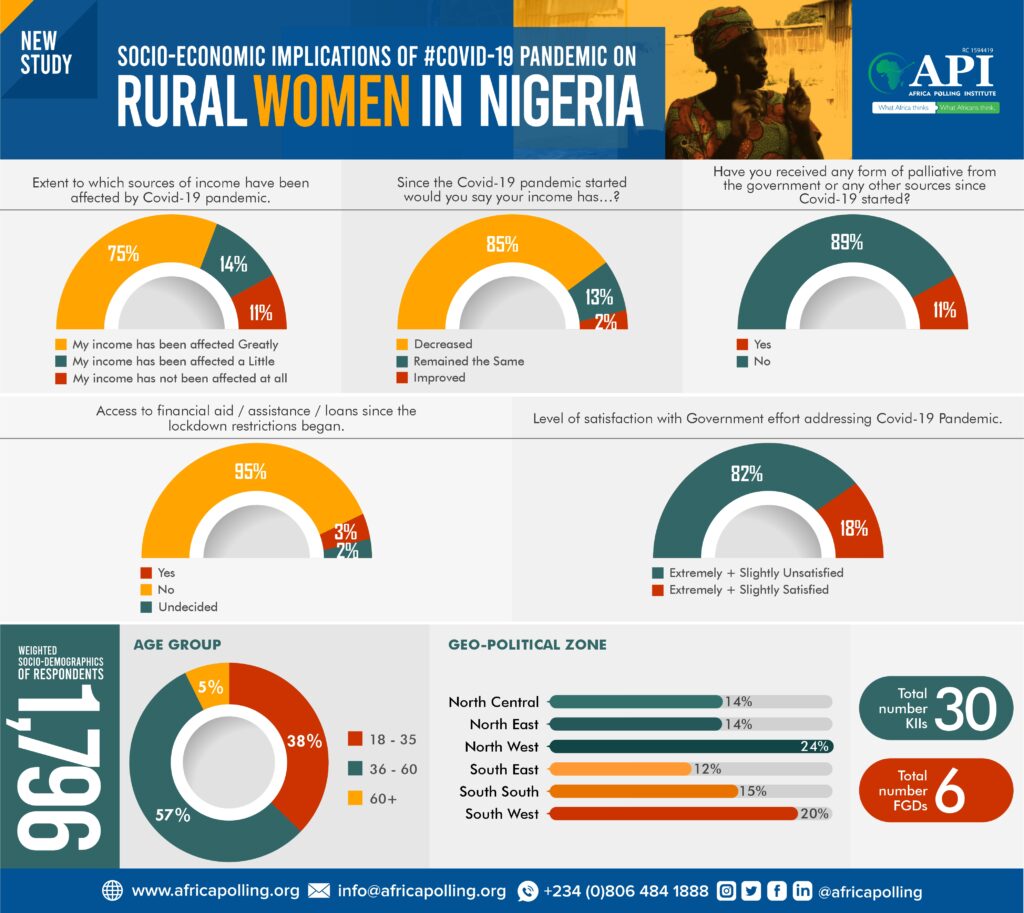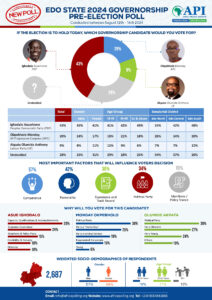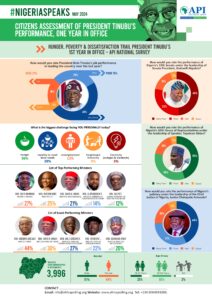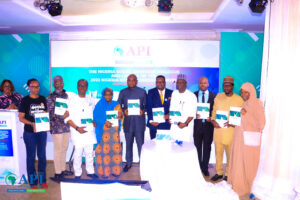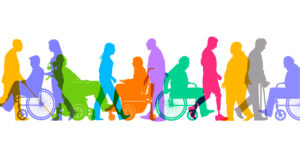•85% of women living in rural areas have experienced a decline in their personal income since the COVID-19 pandemic
•89% did not receive any form of palliative from the government or other sources, and 95% did not receive any form of financial assistance since the lockdown; mainly due to the lack of access to information
•82% say they were unsatisfied with government’s response to COVID-19.
Abuja, Nigeria, December 17, 2020 – A new study report released by Abuja-based opinion research think-tank, Africa Polling Institute (API), has revealed that the novel Coronavirus pandemic (COVID-19) has had a severely negative socio-economic impact on rural women in Nigeria. The report titled: “Socio-economic Implications of COVID-19 Pandemic on Rural women in Nigeria”, was motivated by the growing concerns associated with how the pandemic and the ensuing lockdown restrictions had affected Nigerians, particularly vulnerable groups such as women domiciled in the rural areas. Findings from the study revealed that majority of Nigerian rural women surveyed (75%) expressed that their sources of income had been negatively impacted by the pandemic; with 85% affirming expressly that it led to a drastic reduction in their personal income. In addition, 89% of the women affirmed that they did not receive any form of palliative from the government or any other source during the lockdown and 95% did not receive any form of financial assistance. Furthermore, respondents affirmed that their inability to access financial assistance was attributed to: lack of access to information on loans and other financial opportunities (65%); absence of financial institution within their communities (11%); respondents’ lack of interest (11%); and unsuccessful application of past loans (5%) amongst others. The study also indicated that 82% of the women were unsatisfied with government’s response and management of the COVID-19 pandemic generally.
The study applied a mixed methodology, collecting primary data through a nationwide telephone survey conducted with rural women across the country; and this was triangulated with qualitative data from Key Informant Interviews (KIIs) & Focus Group Discussions (FGDs). Data was collected between the 16th September and 5th October, 2020. API elicited views of Nigerian women who dwell in the rural areas across the country on their perception about implications of the COVID-19 pandemic on the source of their socio-economic livelihood. A Stratified Quota Sampling technique was adopted to representatively select citizens in all 36 states of the nation and the Federal Capital Territory (FCT). A total of 1,796 completed telephone interviews were administered and achieved out of 4,250 calls made, representing a response rate of approximately 42.3%. The questionnaire contained two parts: the first part included questions regarding the socio-demographic information of respondents while the second part contained questions that enabled respondents to give their thought and experiences about the impact of the COVID-19 alongside the ensuing lockdown restrictions on their socio-economic livelihood. All interviews were administered in five languages (English, Pidgin English, Igbo, Hausa and Yoruba) to ensure inclusiveness, wider access and adequate representation. Geographic quotas were assigned to ensure that every senatorial district and state was proportionately represented in the sample. Post-stratification gender, geo-political zones and state weights were constructed and applied to the data to make it more representative of the population. This is intended to allow for more accurate population totals of estimates and to reduce non-response bias. The weights assigned were in proportion to the 2006 Nigerian population figures. The margin of error for this study is ±2 percent at the mid-range, with a confidence interval of 95 percent.
More so, a Multi-stage sampling procedure was deployed in selecting participants who were engaged during KIIs and FGDs. First, each of the focal state was clustered in terms of the 6 geo-political zones of the country with special focus on States where records of the COVID-19 were at their peak as at the end of September, 2020. They were further clustered according to the senatorial districts in the States selected which is 3 per state. Thus, for reasons of convenience and proximity, five persons each were sampled from the six states which totaled 30. Hence, selected women domiciling in rural areas in Lagos, Enugu, Rivers, Kaduna, Bauchi and the FCT were engaged in the KIIs and FGDs.
Key Findings
The study assessed the connections between the novel COVID-19 and its attendant implications on the socioeconomic conditions of rural women in Nigeria. Results and key findings from the telephone survey, KIIs and FGDs are thus presented for comprehensive understanding of the socio-economic realities of Nigerian women who dwell in the rural areas in the wake of the pandemic.
Awareness of the COVID-19 Pandemic
Firstly, in order to gauge the level of awareness of the COVID-19 pandemic, respondents were asked if they were aware of the Coronavirus pandemic. In response, majority (54%) of them said that they were aware, while the remaining 46% of respondents opined that they were unaware of the Coronavirus pandemic. It is quite surprising to note that the data highlights that a considerable proportion of women residing in the rural areas of Nigeria are simply unaware of the existence of the pandemic.
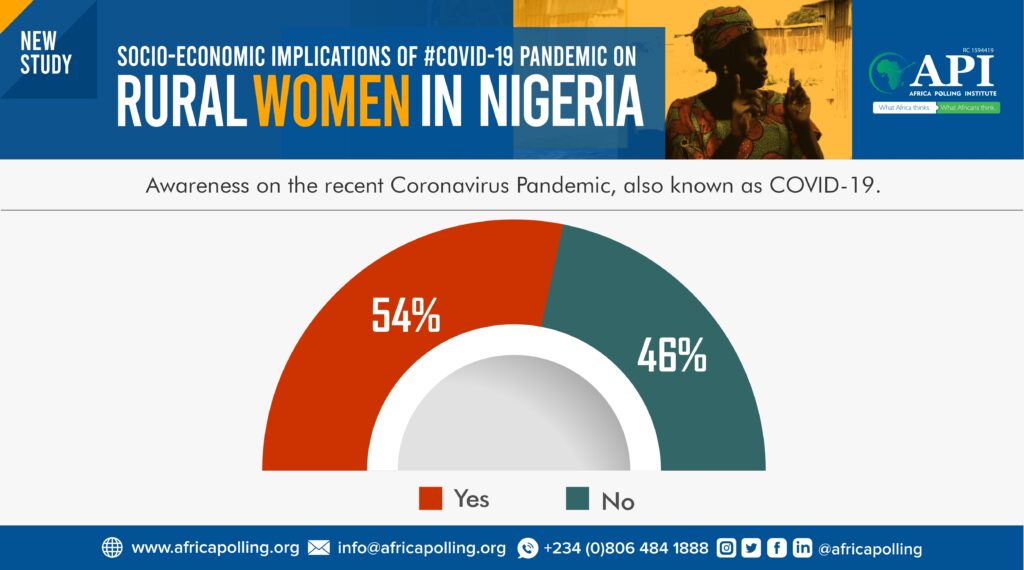
Belief in the Reality of the Coronavirus Pandemic
Overwhelmingly, (89%) of the respondent said they believe COVID-19 is real, while (11%) of respondents said they do not believe that COVID-19 exists at all. Further disaggregation of the data showed that only 76% of respondents from the South-East as against 92% and 92% from the North-West and South-West respectively who agreed that the COVID-19 is real. More younger Nigerian women aged 18-35 years (88%), 36-60 years (90%) submitted that they believe that the COVID-19 pandemic is real as against older respondents caught in the age range of 60+ (83%).
Probing the Source of Income of Nigerian Women before the Pandemic
From the survey, 31% opined that they were strictly engaged in petty trading, while 27% indicated that they were self-employed within the agricultural sector before Covid-19 pandemic. Another 15% said that they had no source of income then implying that they were unemployed, and following closely were the 13% of the respondents who said they were public servants / civil servants (i.e. they worked with government-owned institutions). Another 10% of the women further revealed that their source of income before the pandemic was through quality managerial skills, and lastly 2% of the respondents surveyed revealed that they got income as artisans while the remaining 2% of the respondents said they were working in Non-governmental organizations before the pandemic.
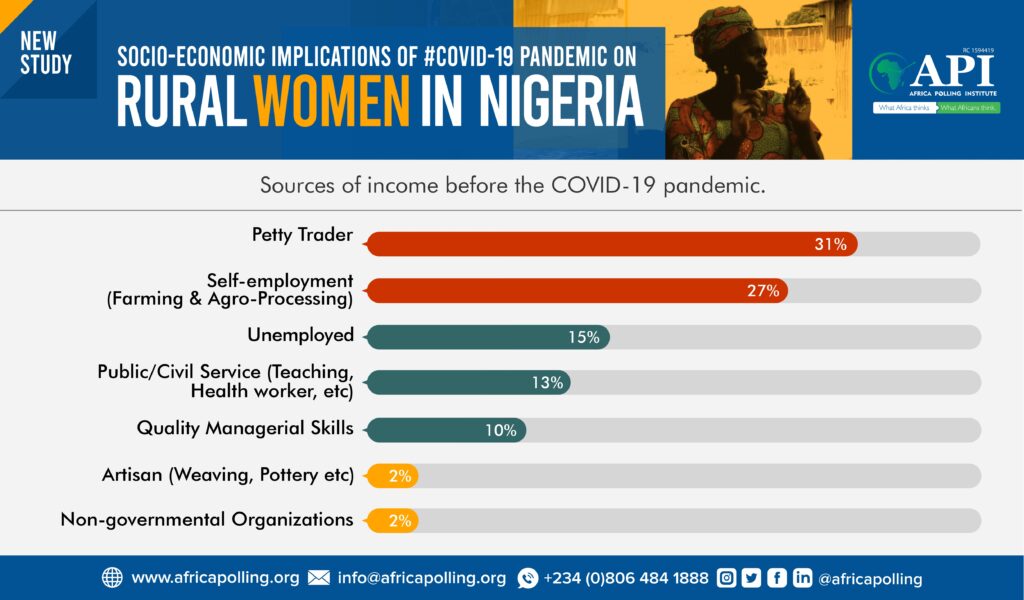
Effect of COVID-19 Pandemic on their Source(s) of Income
Majority of rural women surveyed (75%) revealed that their sources of income had been greatly affected, while 14% revealed that the pandemic has had only little effect on their income, and the remaining 11% said that their income had not been affected at all by the COVID-19 pandemic. Further disaggregation of the data across key demographics indicate some significant variation in response rates. For instance, great deal of respondents (85%) from the South-West actually submitted that their source(s) of income have been affected since the COVID-19 pandemic as against 68% respondents from the North-West who submitted otherwise. More Nigerian women (74%) with no formal education also submitted that their income have been affected since the COVID-19 pandemic as against 84% and 69% who have attained Primary / Secondary and Tertiary Education & above respectively. This clearly indicate that Nigerian women with basic / secondary education were relatively more affected in the wake of the COVID-19 pandemic than those who have not attained any level of education and / or tertiary education. Additionally, a significant number of the rural women when interviewed argued that they could not go to farm at some point; they could not also involve labourers or lend agricultural machines from companies to ease the farming processes. As a result of the closure of markets they also submitted that many of their farm produce that they kept in stock for mini supply to retail sellers got rotten. Those who could sell according to them experienced low patronage as a result of the restrictions of movements.
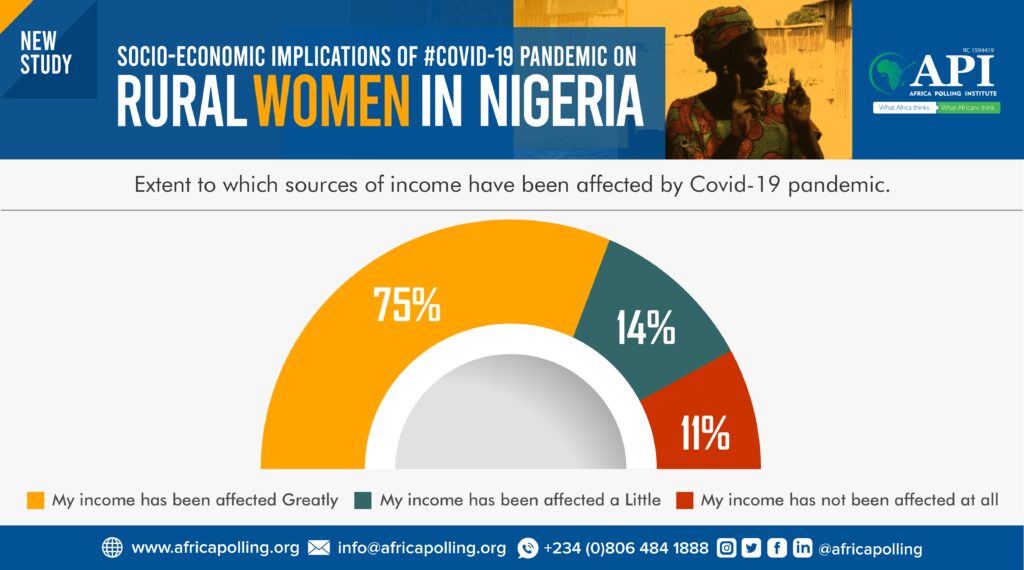
Assessing the Level of Impact of the COVID-19 Pandemic on Nigerian Women
On the economic implication of the COVID-19 pandemic on the women, respondents were further probed to understand the level of impact of the COVID-19 on their source of income. Results show that 85% of them said their income had reduced since the COVID-19 pandemic, 13% submitted that their income had remained the same, while only 2% of the women said that their income had improved since the COVID-19 pandemic. Buttressing the level of impact of the pandemic on the economic realities of rural women, perceptions from the key informant interviews with rural women across Nigeria highlighted that the impact of the lockdown restrictions deepened economic and social stress for the women, coupled with different forms of abuse, ranging from ill-treatment and exploitation, to extortion, and sexual abuse amongst others, which they experienced staying at home during the lockdown.
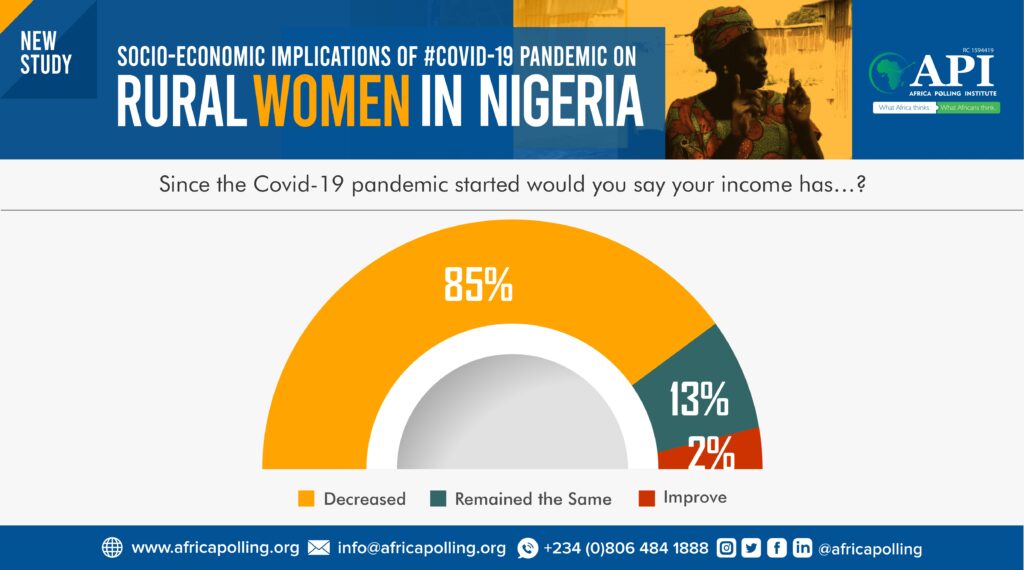
Access to Financial Assistance Since the Start of the Lockdown
Respondents when asked if they were able to access any financial aid or assistance or loan since the lockdown restrictions began indicated varying answers. The survey revealed that 95% of the women did not receive any form of financial assistance since the lockdown restriction began, 3% opined that they received some forms of financial assistance since the lockdown restrictions began, and the remaining 2% of the women surveyed are undecided about this information.
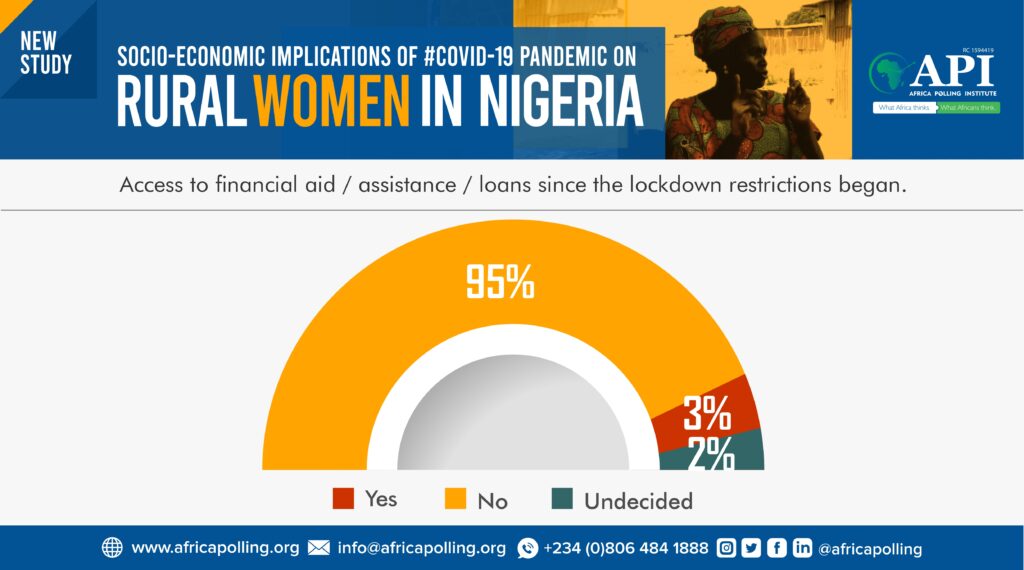
Factors that Affected Women’s Inability to Access Financial Assistance
More so, in an attempt to understand the factors that contributed to the inability of respondents to access financial assistance during the lockdown, it was discovered that 65% of the women identified the ‘lack of access to information on loan and other financial assistance’ as a factor, 11% of the women said they were simply not interested in applying for any financial assistance, another 11% of the women submitted that there was no financial institution giving loan in their community, 5% of them said that they applied for financial assistance and loan but their application was not successful, and 4% said they were not able access financial assistance / loan as a result of the movement restriction. Only, a very small percent (3%) of the respondents revealed that they actually attempted to apply for loans but could not access them due to the high interest and 1% considered the poor moratorium accorded to loans as a major hindrance.
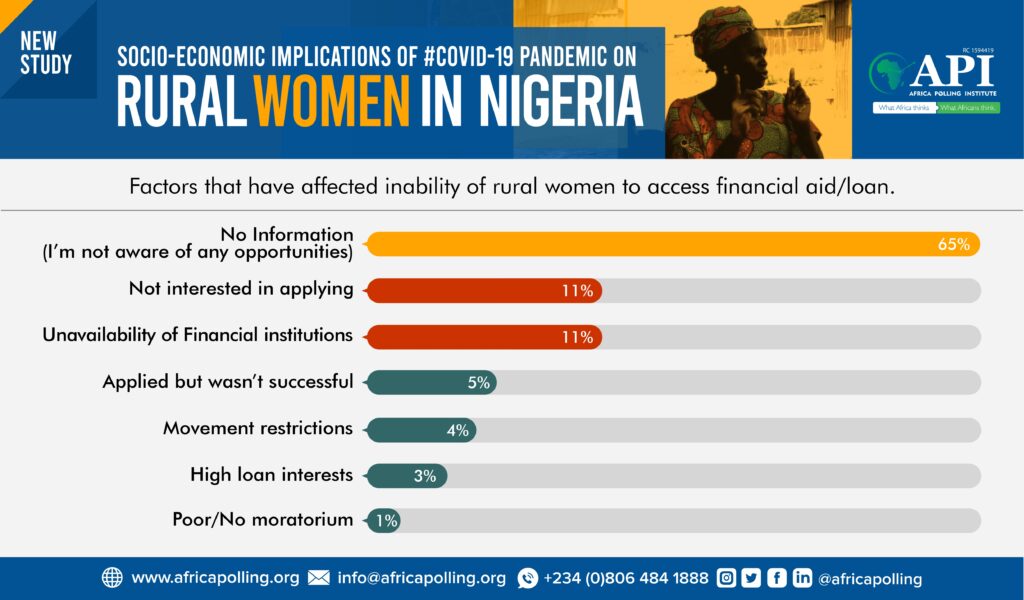
Access to Palliatives from Government or Any Other Sources
When respondents were asked if they have received any form of palliatives from the government or any other source to ease the effect of the lockdown on them, findings from the survey revealed that 89% which is the majority of the respondents received no palliatives whatsoever, either from the government or any other source, despite their knowledge of the acclaimed provision of this by government, while 11% of them said they did receive palliatives from the government or any other source
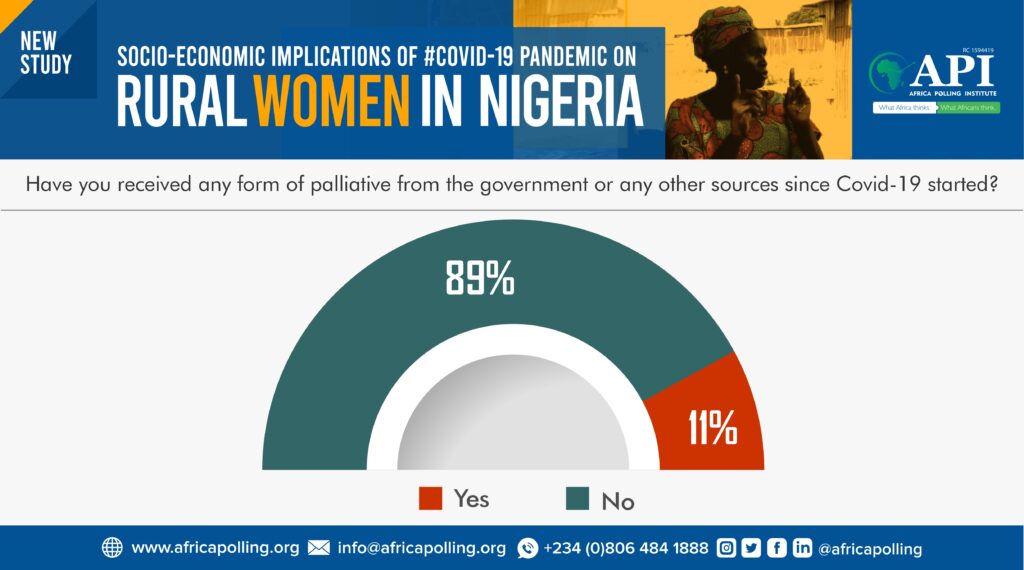
Satisfaction with Government Responses to COVID-19 Pandemic
To gauge the satisfaction of Nigerian women with government’s response to the pandemic, the survey revealed that only a small portion of rural-based women (18%) are either extremely / slightly satisfied with government’s manner of approach to addressing the COVID-19 pandemic generally as a significant 82% of the respondents indicated that they are extremely / slightly unsatisfied with government response to COVID-19 pandemic. Further disaggregation of the data across key demography indicates that respondents from the North-Central (24%) expressed greater satisfaction with government’s response as against only 15% of the respondents from the North-East and North West who indicated their satisfaction with government’s response. Extant literature already indicates that most states in the North-Central are this satisfied because of their proximity to the Federal Capital Territory, Abuja where government’s responses were initiated while responses in the North-East were probably poor because of the unabated insurgent attacks in the region with the attendant military imposition of physical restrictions in some quarters.
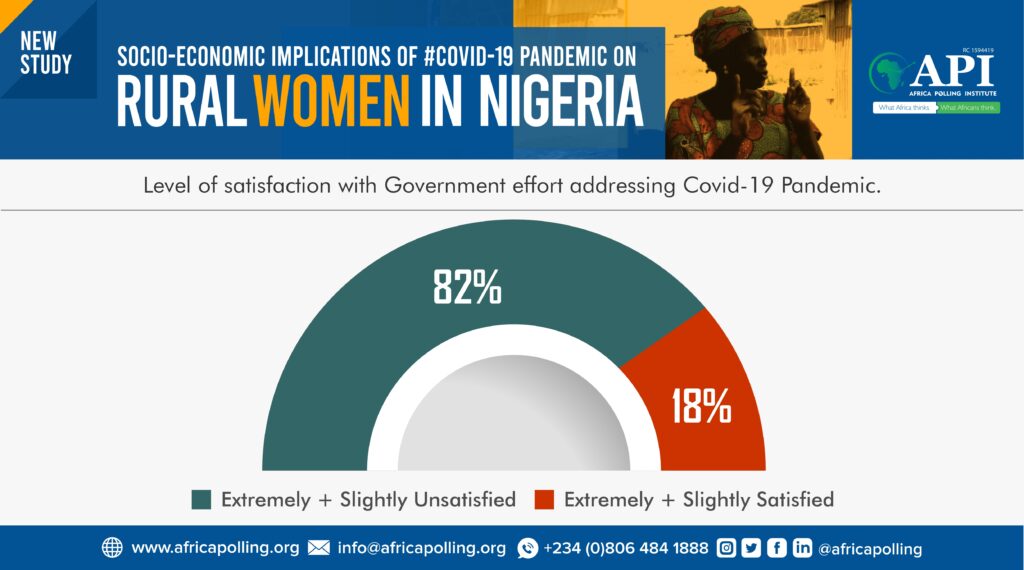
In summary, this latest study by API has shown that government response at cushioning the impact of the COVID-19 pandemic and the attendant consequences of the lockdown has had grievous effects on the poor, particularly the rural women. From the results, it is obvious that the pandemic and the associated lockdown restrictions have negatively impacted the socio-economic conditions of rural women who are mostly found in the villages and hamlets (including farm settlements). This made them even more vulnerable as they submitted that they are already experiencing nutritional challenges. Thus, there is no gainsaying the fact that the restrictions imposed by government at all level in order to curtail both community and individual spread of the virus have affected the income and livelihood of this demography. Hence, rural women who are particularly caught up in this trap have been plagued with poverty, hunger, domestic violence and emotional trauma. They have had to rely on transactional sex as a means of defraying the cost of their daily livelihood.
Recommendations
Arising from the above findings, the study makes the following recommendations:
i. To guide against the harsh socio-economic consequences of the Coronavirus pandemic on rural women, government needs to modernize the nature of rudimentary economic production in such a manner that rural women can exploit the advantages of virtual media platform to help ease the manual rigour involved in production of goods and services. They can be taught how to market their goods online, access loans from financial institutions and determine the process of pricing of goods and services through the use of modern information and communication technology (ICT) tools. Additionally, government should expedite action and distribute the various financial packages meant to alleviate the sufferings of the people at the rural level. Expansive outreach should be undertaken so that rural women can have meaningful access to palliatives like food, drugs and sanitary items.
ii. Government should also diversify the response mechanisms it has employed overtime so as to consolidate on the successes it has achieved so far. The economy can be made freer with more supervision rather than blunt closure of certain production means under the guise of lockdown.
iii. To mitigate the harsh effects of the lockdown on rural women, there is an increasing need for the government to expand the economy by promoting the informal and agricultural sectors which accounts for Nigeria’s largest revenue. The Ministry of Agriculture may initiate government-owned, mechanized system of agricultural production with tangible plans regarding core areas of needs. Long-term plans may be initiated and intended towards actualizing an export-led foreign exchange where both primary and semi-refined agricultural products will lead international trade between Nigeria and their international collaborators. Closely related to this is the need for the government to create and deepen an enabling socioeconomic environment through the provision of infrastructural facilities to smooth the progress of agro-based economic production, thereby creating job opportunities and increasing GDP.
iv. Household based awareness campaign should be initiated on the implications of domestic violence, suppression of rights and mental torture that women undergo in the hands of men. The National Orientation Agency (NOA) can commence routine social education and awareness campaign for rural women who are less educated and poorly exposed on how to manage their homes in the wake of marital frustrations that set in during occasions like this. Their male counterparts may be encouraged to participate too. This will unarguably aid them in addressing squarely any form of harassment that may arise in their respective homes.
v. A governmental response team akin to the National Emergency Management Agency (NEMA) should be set up or NEMA given the responsibility of coordinating the distribution of palliatives such that citizens at the bottom of the pyramid will have access to the palliatives meant for them. Officers of the agency will be held responsible for any lack of coordination or diversion of the said palliatives. This will unarguably help eschew the embarrassing discovery of hidden foods, drugs and agricultural palliatives donated by the Private Sector Coalition Against COVID-19 (CACOVID) by government officials across some states.
Dr. Bell Ihua
Executive Director
Africa Polling Institute (API)
